Fleurs du Mal Magazine


Or see the index
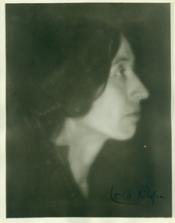
The Fog
Out of the lamp-bestarred and clouded dusk –
Snaring, illuding, concealing,
Magically conjuring –
Turning to fairy-coaches
Beetle-backed limousines
Scampering under the great Arch –
Making a decoy of blue overalls
And mystery of a scarlet shawl –
Indolently –
Knowing no impediment of its sure advance –
Descends the fog.
Lola Ridge
(1873-1941)
The Fog
• fleursdumal.nl magazine
More in: Archive Q-R, Archive Q-R, Ridge, Lola

Lovers
I thought, because we had been friends so long,
That I knew all your dear lips dared intend
Before they dawned to speech. Our thoughts would blend,
I dreamed, like memories that faintly throng.
Your voice dwelt in me like an olden song.
Petal, I thought, from petal I could rend
The blossom of your soul, and at the end
Find still the same sweet fragrance. I was wrong.
Last evening in our eyes love brimmed to birth;
Our friendship faded, lost in passion’s mist.
We had been strangers only! Here, close-caught
Against my heart the dim face I had sought
So long! And now the only thing on earth—
Your piteous mouth, a-tremble to be kissed!
Arthur Adams
(1872-1936)
Lovers
• fleursdumal.nl magazine
More in: Adams, Arthur, Archive A-B, Archive A-B
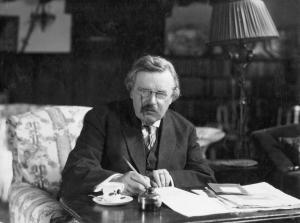
A Fairy Tale
All things grew upwards, foul and fair:
The great trees fought and beat the air
With monstrous wings that would have flown;
But the old earth clung to her own,
Holding them back from heavenly wars,
Though every flower sprang at the stars.
But he broke free: while all things ceased,
Some hour increasing, he increased.
The town beneath him seemed a map,
Above the church he cocked his cap,
Above the cross his feather flew
Above the birds and still he grew.
The trees turned grass; the clouds were riven;
His feet were mountains lost in heaven;
Through strange new skies he rose alone,
The earth fell from him like a stone,
And his own limbs beneath him far
Seemed tapering down to touch a star.
He reared his head, shaggy and grim,
Staring among the cherubim;
The seven celestial floors he rent,
One crystal dome still o’er him bent:
Above his head, more clear than hope,
All heaven was a microscope.
G. K. Chesterton
(1874-1936)
A Fairy Tale
• fleursdumal.nl magazine
More in: Archive C-D, Chesterton, Gilbert Keith, G.K. Chesterton, Grimm, Andersen e.o.: Fables, Fairy Tales & Stories
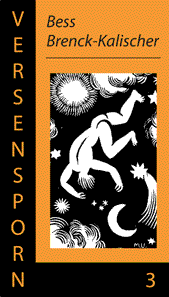
Das Auge flog voran
Das Auge flog voran.
Im Stern verstrickt der Fuß.
Die hingerissene Sonne
Sinkt im Spiegel.
Um jede Wassermühle
Blutet Licht.
Bess Brenck-Kalischer
(Betty Levy, 1878-1933)
Das Auge flog voran
• fleursdumal.nl magazine
More in: # Classic Poetry Archive, Archive A-B, Archive A-B
Like Richard Ellmann’s James Joyce, Richard Zenith’s Pessoa immortalizes the life of one of the twentieth century’s greatest writers.
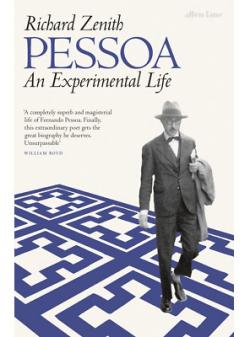 Nearly a century after his wrenching death, the Portuguese poet Fernando Pessoa (1888–1935) remains one of our most enigmatic writers. Believing he could do “more in dreams than Napoleon,” yet haunted by the specter of hereditary madness, Pessoa invented dozens of alter egos, or “heteronyms,” under whose names he wrote in Portuguese, English, and French.
Nearly a century after his wrenching death, the Portuguese poet Fernando Pessoa (1888–1935) remains one of our most enigmatic writers. Believing he could do “more in dreams than Napoleon,” yet haunted by the specter of hereditary madness, Pessoa invented dozens of alter egos, or “heteronyms,” under whose names he wrote in Portuguese, English, and French.
Unsurprisingly, this “most multifarious of writers” (Guardian) has long eluded a definitive biographer—but in renowned translator and Pessoa scholar Richard Zenith, he has met his match.
Relatively unknown in his lifetime, Pessoa was all but destined for literary oblivion when the arc of his afterlife bent, suddenly and improbably, toward greatness, with the discovery of some 25,000 unpublished papers left in a large, wooden trunk. Drawing on this vast archive of sources as well as on unpublished family letters, and skillfully setting the poet’s life against the nationalist currents of twentieth-century European history, Zenith at last reveals the true depths of Pessoa’s teeming imagination and literary genius.
Much as Nobel laureate José Saramago brought a single heteronym to life in The Year of the Death of Ricardo Reis, Zenith traces the backstories of virtually all of Pessoa’s imagined personalities, demonstrating how they were projections, spin-offs, or metamorphoses of Pessoa himself. A solitary man who had only one, ultimately platonic love affair, Pessoa used his and his heteronyms’ writings to explore questions of sexuality, to obsessively search after spiritual truth, and to try to chart a way forward for a benighted and politically agitated Portugal.
Although he preferred the world of his mind, Pessoa was nonetheless a man of the places he inhabited, including not only Lisbon but also turn-of-the-century Durban, South Africa, where he spent nine years as a child. Zenith re-creates the drama of Pessoa’s adolescence—when the first heteronyms emerged—and his bumbling attempts to survive as a translator and publisher.
Zenith introduces us, too, to Pessoa’s bohemian circle of friends, and to Ophelia Quieroz, with whom he exchanged numerous love letters.
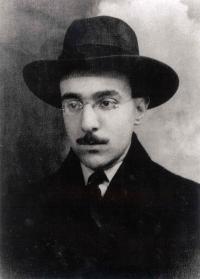 Pessoa reveals in equal force the poet’s unwavering commitment to defending homosexual writers whose books had been banned, as well as his courageous opposition to Salazar, the Portuguese dictator, toward the end of his life. In stunning, magisterial prose, Zenith contextualizes Pessoa’s posthumous literary achievements—especially his most renowned work, The Book of Disquiet.
Pessoa reveals in equal force the poet’s unwavering commitment to defending homosexual writers whose books had been banned, as well as his courageous opposition to Salazar, the Portuguese dictator, toward the end of his life. In stunning, magisterial prose, Zenith contextualizes Pessoa’s posthumous literary achievements—especially his most renowned work, The Book of Disquiet.
A modern literary masterpiece, Pessoa simultaneously immortalizes the life of a literary maestro and confirms the enduring power of Pessoa’s work to speak prophetically to the disconnectedness of our modern world.
Richard Zenith (1956, Washington, D.C.) is an American-Portuguese writer and translator, winner of Pessoa Prize in 2012.
Pessoa
A Biography
by Richard Zenith (Author)
Published by Liveright
July 20, 2021
Language : English
Hardcover : 1088 pages
ISBN-10 : 0871404710
ISBN-13 : 978-0871404718
$40.00
# new biography
Fernando Pessoa
Richard Zenith
• fleursdumal.nl magazine
More in: #Biography Archives, #Editors Choice Archiv, - Book News, - Bookstores, Archive O-P, Archive Y-Z, Art & Literature News, Pessoa, Fernando, TRANSLATION ARCHIVE

Jack And The Bean-Stalk
A lazy and careless boy was Jack,–
He would not work, and he would not play;
And so poor, that the jacket on his back
Hung in a ragged fringe alway;
But ’twas shilly-shally, dilly-dally,
From day to day.
At last his mother was almost wild,
And to get them food she knew not how;
And she told her good-for-nothing child
To drive to market the brindle cow.
So he strolled along, with whistle and song,
And drove the cow.
A man was under the wayside trees,
Who carried some beans in his hand–all white.
He said, “My boy, I’ll give you these
For the brindle cow.” Jack said, “All right.”
And, without any gold for the cow he had sold,
Went home at night.
Bitter tears did the mother weep;
Out of the window the beans were thrown,
And Jack went supperless to sleep;
But, when the morning sunlight shone,
High, and high, to the very sky,
The beans had grown.
They made a ladder all green and bright,
They twined and crossed and twisted so;
And Jack sprang up it with all his might,
And called to his mother down below:
“Hitchity-hatchet, my little red jacket,
And up I go!”
High as a tree, then high as a steeple,
Then high as a kite, and high as the moon,
Far out of sight of cities and people,
He toiled and tugged and climbed till noon;
And began to pant: “I guess I shan’t
Get down very soon!”
At last he came to a path that led
To a house he had never seen before;
And he begged of a woman there some bread;
But she heard her husband, the Giant, roar,
And she gave him a shove in the old brick oven,
And shut the door.
And the Giant sniffed, and beat his breast,
And grumbled low, “Fe, fi, fo, fum!”
His poor wife prayed he would sit and rest,–
“I smell fresh meat! I will have some!”
He cried the louder, “Fe, fi, fo, fum!
I will have some.”
He ate as much as would feed ten men,
And drank a barrel of beer to the dregs;
Then he called for his little favorite hen,
As under the table he stretched his legs,–
And he roared “Ho! ho!”–like a buffalo–
“Lay your gold eggs!”
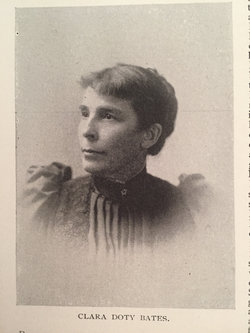
She laid a beautiful egg of gold;
And at last the Giant began to snore;
Jack waited a minute, then, growing bold,
He crept from the oven along the floor,
And caught the hen in his arms, and then
Fled through the door.
But the Giant heard him leave the house,
And followed him out, and bellowed “Oh-oh!”
But Jack was as nimble as a mouse,
And sang as he rapidly slipped below:
“Hitchity-hatchet, my little red jacket,
And down I go!”
And the Giant howled, and gnashed his teeth.
Jack got down first, and, in a flash,
Cut the ladder from underneath;
And Giant and Bean-stalk, in one dash,–
No shilly-shally, no dilly-dally,–
Fell with a crash.
This brought Jack fame, and riches, too;
For the little gold-egg hen would lay
An egg whenever he told her to,
If he asked one fifty times a day.
And he and his mother lived with each other
In peace alway.
Clara Doty Bates
(1838 – 1895)
Jack And The Bean-Stalk
Versified by Mrs. Clara Doty Bates
fleursdumal.nl magazine
More in: Archive A-B, Archive A-B, Bates, Clara Doty, Children's Poetry, Grimm, Andersen e.o.: Fables, Fairy Tales & Stories, Tales of Mystery & Imagination
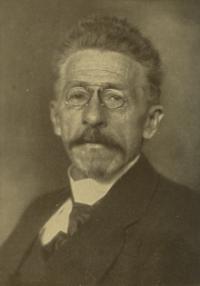
Ganz still zuweilen . . .
Ganz still zuweilen wie ein Traum
klingt in dir auf ein fernes Lied…
Du weißt nicht, wie es plötzlich kam,
du weißt nicht, was es von dir will…
und wie ein Traum ganz leis und still
verklingt es wieder, wie es kam…
Wie plötzlich mitten im Gewühl
der Straße, mitten oft im Winter
ein Hauch von Rosen dich umweht,
wie oder dann und wann ein Bild
aus längst vergessenen Kindertagen
mit fragenden Augen vor dir steht…
Ganz still und leise, wie ein Traum…
Du weißt nicht, wie es plötzlich kam,
du weißt nicht, was es von dir will,
und wie ein Traum ganz leis und still
verblaßt es wieder, wie es kam.
Cäsar Flaischlen
(1864-1920)
Ganz still zuweilen . . .
• fleursdumal.nl magazine
More in: # Classic Poetry Archive, Archive E-F, Archive E-F

China 1899
She lies, a grave disdain all her defence,
Too imperturbable for scorn. She hears
Only the murmur of the flowing years
That thunder slowly on her shores immense
And ebb away in moaning impotence.
Giants enduring, she and Time are peers—
Her dream-hazed eyes knowing no hopes, no tears,
Her glance a langour-lidded insolence.
And though the rabble of the restless West
In her deserted courts set their rash sway,
She heeds them not; as when the sun, withdrawn
From his untarnished sky, knows it distressed
By storm of weakling stars, that he at dawn
Will wither with one ruthless glance away.
Arthur Adams
(1872-1936)
China 1899
• fleursdumal.nl magazine
More in: Adams, Arthur, Archive A-B, Archive A-B
Last evening the T. S. Eliot Prize 2021 – Shortlist was announced.
It shows an eclectic mixture of established poets, none of whom has previously won the Prize, and relative newcomers.
Judges Glyn Maxwell (Chair), Caroline Bird and Zaffar Kunial have chosen the 2021 T. S. Eliot Prize shortlist from a record 177 poetry collections submitted by British and Irish publishers.
The list comprises one debut collection; work from six men and four women; one American; one poet from Ireland; as well as poets of mixed race ancestry, including Jamaican, Jamaican-Chinese and Zambian. Eight publishers are represented, with two titles from small presses.

Here are the ten poets who have been shortlisted by the judges:
Raymond Antrobus – All the Names Given (Picador)
Raymond Antrobus is the author of To Sweeten Bitter and The Perseverance (Penned in the Margins/Tin House) and All the Names Given (Picador 2021). In 2019 he became the first ever poet to be awarded the Rathbone Folio Prize. Other accolades include the Ted Hughes Award, PBS Winter Choice and Sunday Times Young Writer of the year award, as well as being shortlisted for the Griffin Prize and Forward Prize.
Kayo Chingonyi – A Blood Condition (Chatto & Windus)
Kayo Chingonyi is the author of two pamphlets. His first full-length collection, Kumukanda, (Chatto & Windus 2012) won the Dylan Thomas Prize and a Somerset Maugham Award and was shortlisted for the Costa Poetry Prize and the Seamus Heaney Centre First Poetry Collection Prize. His most recent collection is A Blood Condition (Chatto & Windus 2021).
Victoria Kennefick – Eat Or We Both Starve (Carcanet)
Victoria Kennefick’s pamphlet, White Whale (Southword Editions, 2015), won the Munster Literature Centre Fool for Poetry Chapbook Competition and the Saboteur Award for Best Poetry Pamphlet. Her work has appeared in Poetry, The Poetry Review, PN Review, Poetry Ireland Review, The Irish Times, Ambit and elsewhere. Her debut collection Eat Or We Both Starve was published by Carcanet in 2021.
Selima Hill – Men Who Feed Pigeons (Bloodaxe)
Selima Hill is a prodigiously prolific poet, who has produced nineteen books of poetry, all published by Bloodaxe. Her 1997 collection, Violet, was shortlisted for the Forward Poetry Prize, the T. S. Eliot Prize and the Whitbread Poetry Award. Bunny (2001), won the Whitbread Poetry Award, was a Poetry Book Society Choice and was shortlisted for the T. S. Eliot Prize. Her new collection is Men Who Feed Pigeons (Bloodaxe 2021).
Hannah Lowe – The Kids (Bloodaxe)
Hannah Lowe’s first poetry collection Chick (Bloodaxe 2013) won the Michael Murphy Memorial Award for Best First Collection, was shortlisted for the Forward Prize for Best First Collection and the Seamus Heaney Centre Prize for Poetry, and was selected for the Poetry Book Society’s Next Generation Poets 2014 promotion. Her second collection was Chan and her third collection, The Kids, (Bloodaxe 2021) was a Poetry Book Society Choice.
Michael Symmons Roberts – Ransom (Cape Poetry)
Michael Symmons Roberts’s eight poetry collections have all been published by Cape and include Corpus, which was the winner of the 2004 Whitbread Poetry Award, and was shortlisted for the T. S. Eliot Prize, the Forward Prize and the Griffin International Prize. Drysalter was the winner of the 2013 Forward Prize and the Costa Poetry Prize and was shortlisted for the T. S. Eliot Prize. His eighth poetry collection is Ransom (Cape Poetry, 2021).
Daniel Sluman – single window (Nine Arches Press)
Daniel Sluman co-edited the first major UK Disability poetry anthology, Stairs and Whispers: D/deaf and Disabled Poets Write Back, (2017) with Sandra Alland and Khairani Barokka. He has previously published two poetry collections, Absence has a weight of its own (2012) and the terrible (2015), both Nine Arches Press. His third poetry collection, single window, was published in 2021 by Nine Arches Press.
Joelle Taylor – C+nto & Othered Poems (The Westbourne Press)
Joelle Taylor has published four collections of poetry: Ska Tissue (2011, Mother Foucault Press), The Woman Who Was Not There (2014, Burning Eye Books) and Songs My Enemy Taught Me (2017, Out-Spoken Press). She founded SLAMbassadors for the Poetry Society in 2001 and is the host of London’s premier night of poetry and music Out-Spoken. C+not & Othered Poems was published in 2021 by The Westbourne Press.
Jack Underwood – A Year in the New Life (Faber)
Jack Underwood was a winner of the Eric Gregory Award in 2007 and his debut pamphlet was published by Faber as part of the first Faber New Poets series in 2009. His debut poetry collection, Happiness (Faber, 2015), won the Somerset Maugham Award. He is a senior lecturer in English and Creative Writing at Goldsmiths College, University of London. His second collection, A Year in the New Life, was published by Faber in 2021.
Kevin Young – Stones (Cape Poetry)
Kevin Young is the author of fifteen books of poetry and prose, including Brown; Blue Laws: Selected & Uncollected Poems 1995-2015; Book of Hours, Jelly Roll: a blues, Bunk and The Grey Album. He is the Andrew W. Mellon Director of the Smithsonian’s National Museum of African American History and Culture and the poetry editor of the New Yorker. Stones (Cape 2021) is the first of his poetry collections to be published in the UK.

The T. S. Eliot Prize is run by the T. S. Eliot Foundation. The T. S. Eliot Prize is the most valuable prize in British poetry – the winning poet will receive a cheque for £25,000 and the shortlisted poets will be presented with cheques for £1,500. It is the only major poetry prize which is judged purely by established poets. The 2021 judging panel are looking for the best new poetry collection written in English and published in 2021 in the UK or Ireland.
Chair Glyn Maxwell said:
‘Judging the T. S. Eliot Prize 2021, I am lucky enough to be joined by two of my favourite younger poets, Caroline Bird and Zaffar Kunial. We are delighted with our shortlist, while lamenting all the fine work we had to set aside. Poetry styles are as disparate as I’ve ever known them, and the wider world as threatened and bewildered as any of us can remember. Out of this we have chosen ten books that sound clear and compelling voices – of the moment, yet also below and beyond it. Older and younger, wiser and wilder, well-known and lesser-known, these are the ten voices we think should enter the stage and be heard in the spotlight, changing the story while there’s a story to be changed.’
The T. S. Eliot Prize Shortlist Readings will take place on Sunday 9th January 2022 in the Southbank Centre’s Royal Festival Hall in London as part of its literature programme. The shortlist readings are the largest annual poetry event in the UK and will be hosted once again by Ian McMillan.
Tickets for the Readings in the Royal Festival and the simultaneously streamed event are now on sale from the box office: 0203 879 9555 (Open from 10am – 2pm Monday to Friday). Website: www.southbankcentre.co.uk
The winner of the 2021 Prize will be announced at the Award Ceremony on Monday 10th January 2022, where the winner and the shortlisted poets will be presented with their cheques.
Last year’s winner was Bhanu Kapil’s How to Wash a Heart and the judges were Lavinia Greenlaw (chair), Mona Arshi and Andrew McMillan.
The T. S. Eliot Prize, which former Poet Laureate Andrew Motion has described as “the Prize most poets want to win”, is an annual prize for the best new poetry collection published in the UK or Ireland.
T. S. Eliot Prize 2021 – Shortlist Announced
# For more information click for the T S Eliot Prize website
• fleursdumal.nl magazine
More in: #Editors Choice Archiv, #Modern Poetry Archive, #More Poetry Archives, Archive E-F, Art & Literature News, AUDIO, CINEMA, RADIO & TV, Awards & Prizes, Eliot, T. S.
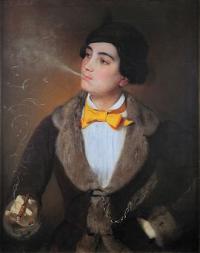
Die wilde Rose
Da droben auf einsamer Höhe
Die wilde Rose blüht,
Und wer sie von Ferne gesehen,
In heißer Sehnsucht erglüht.
Zu ihr über Felsen und Klüfte
Ein kühner Jäger klimmt.
Schon ist er in nächster Nähe –
Das Auge in Thränen ihm schwimmt.
Er will sie erfassen und pflücken.
Da strauchelt jäh sein Fuß;
Des Abgrunds finstere Tiefe
Empfängt ihn mit kaltem Kuß.
Da droben auf einsamer Höhe
Die wilde Rose blüht,
Und wer sie von Ferne gesehen.
In heißer Sehnsucht erglüht. –
Louise Aston
(1814-1871)
Die wilde Rose
• fleursdumal.nl magazine
More in: # Classic Poetry Archive, Archive A-B, Archive A-B, Feminism
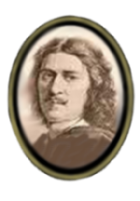
Plainte sur la mort de Sylvie
Ruisseau qui cours après toi-même
Et qui te fuis toi-même aussi,
Arrête un peu ton onde ici
Pour écouter mon deuil extrême.
Puis, quand tu l’auras su, va-t’en dire à la mer
Qu’elle n’a rien de plus amer.
Raconte-lui comme Sylvie,
Qui seule gouverne mon sort,
A reçu le coup de la mort
Au plus bel âge de la vie,
Et que cet accident triomphe en même jour
De toutes les forces d’Amour.
Las ! je n’en puis dire autre chose,
Mes soupirs tranchent mon discours.
Adieu, ruisseau, reprends ton cours
Qui, non plus que moi, se repose ;
Que si, par mes regrets, j’ai bien pu t’arrêter,
Voici des pleurs pour te hâter.
Marc-Antoine Girard de Saint-Amant
(1594 – 1661)
Plainte sur la mort de Sylvie
• fleursdumal.nl magazine
More in: # Classic Poetry Archive, Archive G-H, Archive S-T, Archive S-T
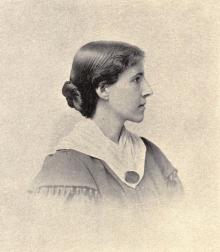
Boys will be boys
“Boys will be boys,” and boys have had their day;
Boy-mischief and boy-carelessness and noise
Extenuated all, allowed, excused and smoothed away,
Each duty missed, each damaging wild act,
By this meek statement of unquestioned fact–
Boys will be boys!
Now, “women will be women.” Mark the change;
Calm motherhood in place of boisterous youth;
No warfare now; to manage and arrange,
To nurture with wise care, is woman’s way,
In peace and fruitful industry her sway,
In love and truth.
Charlotte Perkins Gilman
(1860-1935)
Boys will be boys
Suffrage Songs and Verses
• fleursdumal.nl magazine
More in: # Classic Poetry Archive, Archive G-H, Archive G-H, Feminism
Thank you for reading Fleurs du Mal - magazine for art & literature